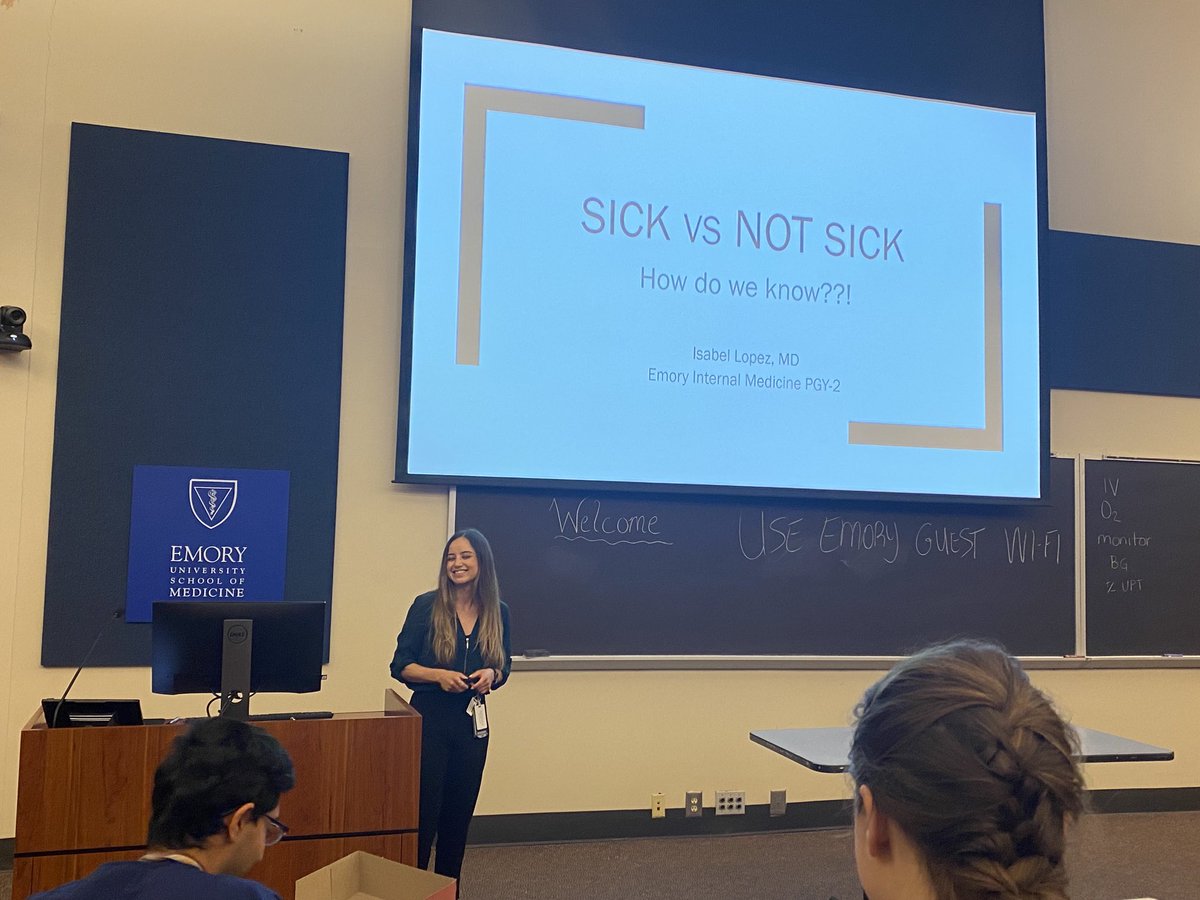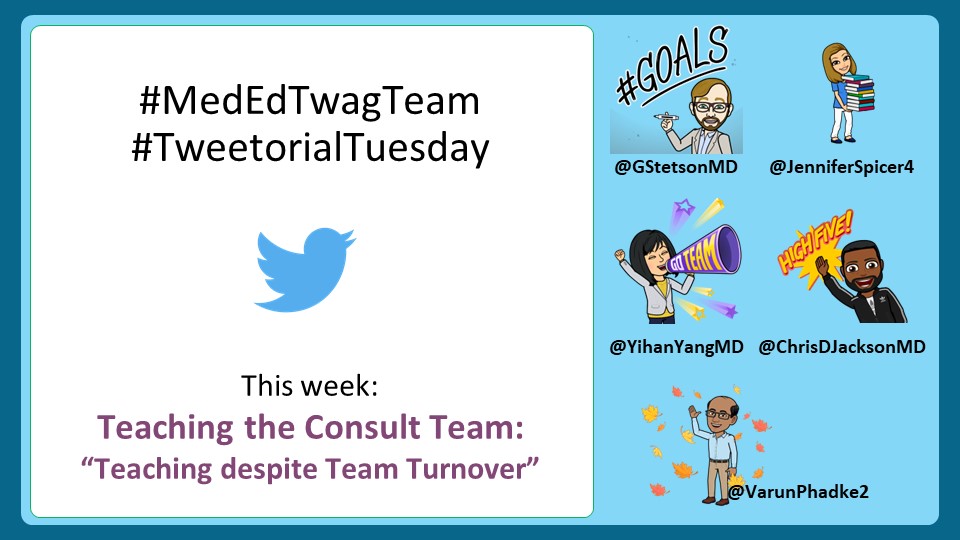1/ You're seeing a new consult with your team, and you want to teach the primary team too.
But WHEN is the best time to teach them?
On the phone?
At the bedside?
In their team room?
And in the morning?
Or maybe the afternoon?
This week:
But WHEN is the best time to teach them?
On the phone?
At the bedside?
In their team room?
And in the morning?
Or maybe the afternoon?
This week:

2/ Last week @VarunPhadke2 described all of the individuals whom we can teach during the day.
But when should we teach them?
Often we default to teaching on the phone when receiving the consult or giving recommendations, but there are other options too.
https://twitter.com/VarunPhadke2/status/1630620614179405845
But when should we teach them?
Often we default to teaching on the phone when receiving the consult or giving recommendations, but there are other options too.
3/ This week we will discuss the pros & cons of those options.
With one caveat.
Often the best time to teach is the one most convenient to your team & the primary team, which depends on your local institution's workflow.
But let's explore some general principles to consider.
With one caveat.
Often the best time to teach is the one most convenient to your team & the primary team, which depends on your local institution's workflow.
But let's explore some general principles to consider.
4/ Option #1: Receiving the consult
We are often tempted to teach during the initial phone call when receiving the consult.
This can be a great time to teach, but there are many potential pitfalls including:
🌟 Time pressure
🌟 Perceived pushback
🌟 Inadequate information
We are often tempted to teach during the initial phone call when receiving the consult.
This can be a great time to teach, but there are many potential pitfalls including:
🌟 Time pressure
🌟 Perceived pushback
🌟 Inadequate information

5/ If we do use the initial phone call as our teaching time (which may be ideal if the primary team is unavailable later in the day), then we should:
✅ keep it short
✅ be humble
See these tips from @VarunPhadke2's suggestions for "receiving a consult"
✅ keep it short
✅ be humble
See these tips from @VarunPhadke2's suggestions for "receiving a consult"
https://twitter.com/VarunPhadke2/status/1600307086163836930
6/ Option #2: Reviewing Information Together
On consult teams, we often interact w/ other health professionals to answer the consult question, such as:
📌 Radiologists
📌 Pathologists
📌 Clinical lab techs
📌 Other consulting teams
Why not ask the primary team to join?
On consult teams, we often interact w/ other health professionals to answer the consult question, such as:
📌 Radiologists
📌 Pathologists
📌 Clinical lab techs
📌 Other consulting teams
Why not ask the primary team to join?
7/ This provides a great opportunity for multi-disciplinary teaching & learning.
For example, while reviewing imaging:
➡️ The consult team discusses the Ddx
➡️ The primary team provides additional history/context
➡️ The radiologist points out imaging findings that alter the Ddx
For example, while reviewing imaging:
➡️ The consult team discusses the Ddx
➡️ The primary team provides additional history/context
➡️ The radiologist points out imaging findings that alter the Ddx
8/ Option #3: At the Bedside
We are often teaching our team at the bedside; why not get a 2-for-1 and invite the primary team to join?
This can be difficult to schedule, but it can be a great way to facilitate communication between the primary team, consult team, & patient.
We are often teaching our team at the bedside; why not get a 2-for-1 and invite the primary team to join?
This can be difficult to schedule, but it can be a great way to facilitate communication between the primary team, consult team, & patient.
9/ If teaching at the bedside, just make sure that you understand the primary team's time limitations and focus on content that's relevant to them.
See below for examples of WHAT to teach!
See below for examples of WHAT to teach!

10/ Option #4: Delivering Recommendations
This is the most common time that most of us teach - either on the phone or in person.
In person is often best since it can help build relationships, but differing workflows often make this difficult.
This is the most common time that most of us teach - either on the phone or in person.
In person is often best since it can help build relationships, but differing workflows often make this difficult.
11/ Just remember to consider where the learner is in terms of:
🌟 Time/space
🌟 Prior knowledge
🌟 Emotional valence re: the consult ask
as previously outlined by @VarunPhadke2
These factors will impact what type of teaching you do.
🌟 Time/space
🌟 Prior knowledge
🌟 Emotional valence re: the consult ask
as previously outlined by @VarunPhadke2
https://twitter.com/VarunPhadke2/status/1605245928549629960
These factors will impact what type of teaching you do.
12/ All the options that we've presented today refer to teaching in relation to a consult question on a specific patient.
But remember that other opportunities for teaching include formal didactics (morning report, noon conference, etc) or even informal encounters with teams!
But remember that other opportunities for teaching include formal didactics (morning report, noon conference, etc) or even informal encounters with teams!
13/ In summary, remember that many different times & locations exist for teaching the primary team.
📌 Receiving the consult
📌 Reviewing info together
📌 At the bedside
📌 Delivering recommendations
Consider the pros & cons associated with each to help you decide WHEN to teach
📌 Receiving the consult
📌 Reviewing info together
📌 At the bedside
📌 Delivering recommendations
Consider the pros & cons associated with each to help you decide WHEN to teach

14/ Thanks for joining! Next week @VarunPhadke2 will continue the "Teaching the Primary Team" segment with ”The What.”
And follow @MedEdTwagTeam, @ChrisDJacksonMD, @GStetsonMD, & @YihanYangMD so you don't miss a thread!
And follow @MedEdTwagTeam, @ChrisDJacksonMD, @GStetsonMD, & @YihanYangMD so you don't miss a thread!

• • •
Missing some Tweet in this thread? You can try to
force a refresh
















